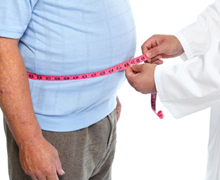
Lack of sleep is tied to many detrimental health consequences such as anxiety and weight gain, but new research shows it’s where that weight is added that is most concerning. Researchers from the Mayo Clinic found insufficient sleep led healthy study participants to consume more calories and increase their abdominal visceral fat by 11 percent over a short period of time.
Visceral fat is belly fat that is deep within the abdomen. It surrounds the internal organs and is strongly linked to cardiac and metabolic diseases.
It is estimated that roughly one-third of adults in the U.S. do not get enough sleep on a daily basis. This is in part due to shift work and too much screen time and other electronic distractions. And the longer people stay awake the more likely they are to consume additional food.
"Our findings show that shortened sleep, even in young, healthy and relatively lean subjects, is associated with an increase in calorie intake, a very small increase in weight, and a significant increase in fat accumulation inside the belly," says principal investigator Virend Somers, M.D., Ph.D. "Normally, fat is preferentially deposited subcutaneously or under the skin. However, the inadequate sleep appears to redirect fat to the more dangerous visceral compartment."
The study cohort in the randomized controlled crossover study consisted of 12 healthy people who were not obese. Each participant spent two 21-day sessions in an inpatient setting. They had access to their choice of food throughout the study and participants were measured for energy intake and energy expenditure, as well as body weight, composition and fat distribution.
The participants were randomly assigned to the control group or the restricted sleep group during the first 21-day session. After a three-month dead period the participants were assigned to the opposite group from the one they completed the first time around.
The study period started with four days of acclimation. During that time all participants were allowed nine hours of sleep. Afterward, the restricted sleep group was limited to four hours of sleep for two weeks. That was followed by a three-day recovery period where all participants were again allowed to sleep nine hours. The sleep deprived participants consumed on average 300 more calories per day but their energy expenditure stayed the same.
The study results, which were published in the Journal of the American College of Cardiology, surprised researchers because of what happened during the recovery period.
"Importantly, although during recovery sleep there was a decrease in calorie intake and weight, visceral fat continued to increase," Dr. Somers said. "This suggests that inadequate sleep is a previously unrecognized trigger for visceral fat deposition, and that catch-up sleep, at least in the short term, does not reverse the visceral fat accumulation. In the long term, these findings implicate inadequate sleep as a contributor to the epidemics of obesity, cardiovascular and metabolic diseases."
Click here to read more in the Journal of the American College of Cardiology.
